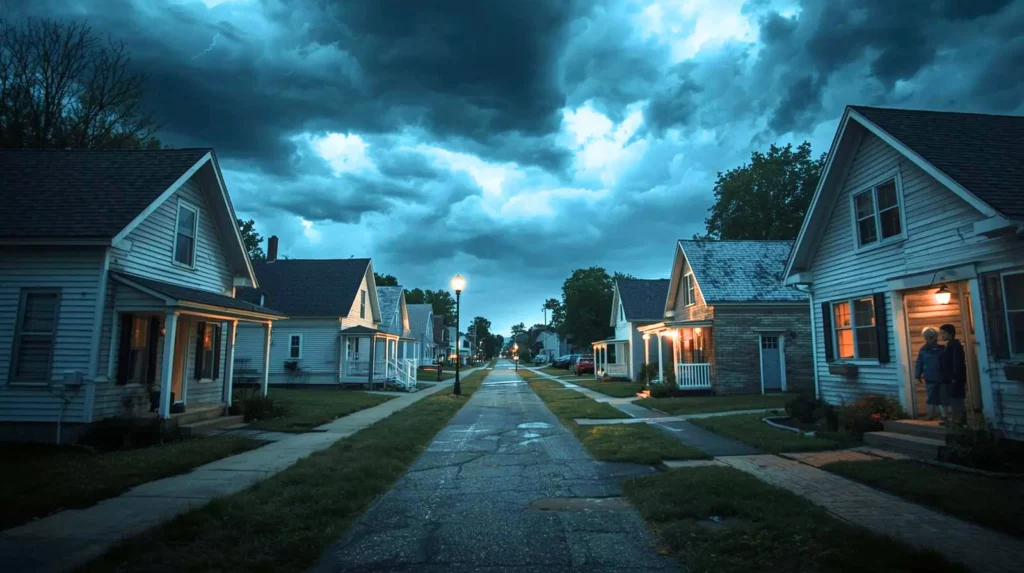
A quiet street. A friendly neighbor. A missing person.
Small towns promise safety—but what happens when that promise is broken?
The Comfort and the Trap of Familiarity
Small towns feel safe. There’s a sense of belonging, of rhythms and routines that ground daily life. Children play outside, doors are left unlocked. You might know your neighbors well enough to borrow a ladder or share a coffee. But you might not actually know the family down the next block at all.
That’s what makes these communities such powerful settings for thrillers: the illusion of knowing everyone, of being secure, but not enough to see what’s really going on. The people we pass every day might hold stories we can’t begin to imagine.
Bleeding Hearts Valley: When Normal Vanishes Overnight
In An Abrupt Departure, Graham Hall steps into an abandoned apartment expecting to haul away junk. What he finds instead are the traces of a vanished life—photos, passports, medications left behind. The building’s stillness feels wrong, its silence heavy.
Neighbors give conflicting stories. The landlord deflects questions. Expensive electronics sit untouched. As Graham digs deeper, the mystery grows darker.
Bleeding Hearts Valley isn’t the kind of place you expect to harbor violence, but that’s what makes the disappearance so disturbing. The stillness of the town becomes part of the tension, masking a truth no one wants uncovered.
Roxboro: Where Science Meets Small-Town Politics
In the Kenzie Kirsch Medical Thrillers, the small town of Roxboro hums with quiet competition and professional pride. Kenzie, the assistant medical examiner, works in a community where autopsies can expose not only crimes but long-held grudges, personal failings, and political pressures.
Roxboro and the surrounding towns aren’t idyllic, they are complex. Some people know too much about each other, others are desperate to keep their lives private. Kenzie lives in the community and has to walk a fine line between revealing the truth and surviving the fallout.
Loose the Dogs: The Danger We Invite Home
In Loose the Dogs, the danger doesn’t come from a stranger in a dark alley. It’s something we welcome into our homes and convince ourselves we can control.
When seven dogs with a questionable history are adopted by unsuspecting families, the threat becomes domestic—intimate. The professionals and bureaucrats who rehomed them believe they’ve done the right thing, until the consequences prove otherwise.
The horror here isn’t random—it’s systemic. A decision made far away ripples into living rooms and backyards across the country. The real terror lies in what we choose not to see.
The Real Face of the Small-Town Thriller
In a small town, secrets travel faster than facts. Whispers fills in the gaps, reputation becomes currency, and truth is hidden behind closed doors. There are always people watching—but not always for the right reasons.
It’s not that everyone knows everyone else’s business; it’s that they think they do. And that assumption—of safety, of familiarity—is what makes small-town thrillers so unnerving. There’s always more beneath the surface.
Readers feel that tension instinctively. It’s the unease of knowing that darkness can thrive in ordinary places—and that danger might be closer than we realize.
Read Next
👉 When Love Turns Dangerous: Obsession and Control in Psychological Thrillers
👉 Clean Psychological Thrillers: Heart-Pounding Suspense Without the Gore
👉 Twisted Truths and Haunted Minds: The Psychology Behind the Thriller
Frequently Asked Questions
Q: Why do so many thrillers take place in small towns?
Because the quiet backdrop heightens every disturbance. Secrets feel heavier when they’re surrounded by routine, and danger feels closer when there’s nowhere anonymous to hide.
Q: What makes small-town thrillers so unsettling?
It’s the clash between normalcy and horror. The people you wave to in the grocery store might be hiding something—and that tension lingers long after you close the book.
Q: How does Roxboro add to the tension in the Kenzie Kirsch Medical Thrillers?
Roxboro’s size makes it personal. Professional rivalries, family ties, and local politics overlap, turning each case into a moral and social minefield.
Q: Why is Bleeding Hearts Valley such an effective setting in An Abrupt Departure?
Because its calm appearance makes the truth even harder to face. When something terrible happens in a place that’s supposed to be safe, every crack in the façade feels like a betrayal.
Q: Why do readers relate so strongly to small-town thrillers?
Because they blend the familiar and the frightening. We recognize the streets, the people, the comfort—and we feel the shock when that comfort shatters.


